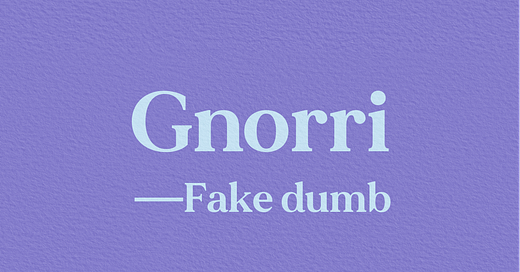Gnorri (transl. Fake dumb)
I won't play dumb: I chose this expression to promote the free weekly grammar lesson.
🎙️ COME SI PRONUNCIA?
[NYOHR-ree]
SOSTANTIVO INVARIABILE
INVARIABLE NOUN
Fake dumb
🇮🇹 Usato solo nell'espressione "fare lo gnorri": fingere di non capire o di ignorare qualcosa.
🇬🇧 Used only in the expression "fare lo gnorri": to pretend not to understand or to ignore something.
💬 ESEMPI
Non fate gli gnorri, so che avete sentito quello che ho detto!
Don't play dumb, I know you heard what I said!
Quando gli ho chiesto dei soldi che mi deve, ha fatto lo gnorri.
When I asked him about the money he owes me, he played dumb.
🔎 L’ORIGINE DELLA PAROLA
🇮🇹 Gnorri deriva dal verbo ignorare, in particolare dalla forma non più in uso gnoro.
La parola è stata formata sostituendo la -o finale con una -i, tipica dei cognomi italiani, creando così una personificazione dell'ignoranza.
Gnorri non è un semplice sinonimo di ignorante, ma rappresenta specificamente colui che finge di non sapere o non capire. È come se Gnorri fosse il cognome di un personaggio immaginario, l'incarnazione della finta ignoranza: il "Signor Gnorri", l'archetipo del finto tonto.
Come si dice fare lo gnorri nella tua lingua?
(Non fare lo gnorri, so che hai letto questa domanda)
🇬🇧 Gnorri derives from the verb ignorare [to ignore], particularly from the no longer used form gnoro.
The word was formed by replacing the final -o with an -i, typical of Italian surnames, thus creating a personification of ignorance.
Gnorri is not a simple synonym for ignorant, but specifically represents someone who pretends not to know or understand. It's as if Gnorri were the surname of an imaginary character, the embodiment of feigned ignorance: "Mr. Gnorri", the archetype of the fake fool.
How do you say fare lo gnorri in your language? Do you have a similar expression?
(Don't play dumb, I know you read this question)
🎒 LA LEZIONE DELLA SETTIMANA
A FREE LESSON ON ITALIAN GRAMMAR AND SOME EXERCISE TO TEST YOUR KNOWLEDGE
🇮🇹 Lo, Gli e Uno
Come scrivevo all’inizio, non farò la gnorri: ho scelto la parola di oggi perché volevo parlarti della lezione di questa settimana, ma non volevo usare gnocchi come parola del giorno perché immagino che la conosci già, no?
E tu, hai mai avuto dubbi su quale articolo utilizzare? Se vuoi ripassare Lo, Gli e Uno, e fare qualche esercizio, qui sotto trovi pane per i tuoi denti.
🇬🇧 Lo, Gli and Uno
As I wrote at the beginning, I won't play dumb: I chose today's word because I wanted to tell you about this week's lesson, but I didn't want to use gnocchi as the word of the day because I imagine you already know it, right?
Have you ever had doubts about which article to use? For example, do you say i gnocchi or gli gnocchi? If you want to review Lo, Gli and Uno, and do some exercises, here you'll find something to sink your teeth into.
👉 YOUR TURN
Can you use the word GNORRI correctly in a sentence?
Based on the definition and examples provided, write a sentence using today's word of the day and share it as a comment on this post. It is important that your sentence makes sense and shows that you understand the word's definition, but we also encourage you to use creativity and have fun.






Il bambino fa lo gnorri quando i suoi genitori gli dicono di mettere via i suoi giocattoli. Quindi la mamma gli dice arrabbiata: " Mauro, non fare gli gnorri e metti subito a posto i giocattoli che sono tutti per terra."
Nella mia lingua si dice "praviti se lud/blesav/glup" (letteralmente, "farsi matto/schiocco/stupido") l'espressione e quasi uguale. Tutte queste parole significano più o meno lo stesso in questo contesto, un modo di fingere di non capire bene.